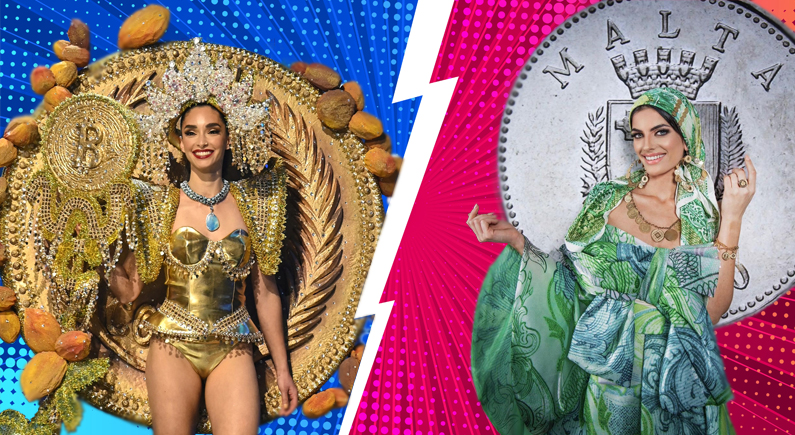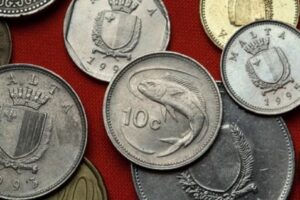Fiat and Crypto on Miss Universe stage: Who of the two will fare better?

The Miss Universe 71st annual pageant will take place tonight Saturday, January 14th at 8 p.m. ET/7 p.m. CT, and will include more than 80 contenders vying for the Crown while representing their nation.
Fiat vs Crypto: The race is on
Miss Universe Malta has been seen sporting a national outfit modelled after the Maltese lira. On the other hand, this year’s El Salvadoran Miss Universe contender featured Bitcoin as part of her national costume.
The past against the future
The Maltese Lira served as the currency of the Republic of Malta in the past dating from 1972 until 2008, when it was replaced by the Euro. The Lira is closely related to the British currency unit Pound, which served as Malta’s currency from 1825 to 1972. The Maltese Lira is obsolete. To honour this significant aspect of Malta’s national heritage, Maltese designers created a garment for the model featuring the past LM 10c coin in a visual style that has been digitally altered.

The colón, the dollar, the bitcoin symbol, and cacao beans are all shown on Miss El Salvador’s national costume. Cacao was once used as money in El Salvador. From 1892 to January 2001, the colón served as El Salvador’s official currency, replacing the dollar. El Salvador has made bitcoin legal tender and established new regulations to allow for the issue of its long-awaited Volcano bonds, which are backed by Bitcoin. In September 2021, El Salvador became the first nation to formally recognise the largest cryptocurrency as legal cash. Since then, the nation has acquired thousands of BTC for its treasury, under the leadership of the pro-bitcoin president Nayib Bukele. This costume depicts her country’s monetary system’s past and future.

Is Malta holding on to the fiat currency habit?
Malta has opted for a past fiat currency costume.

The advantages of virtual currencies over traditional fiat currencies are promising, and their potential has been recognised by several jurisdictions, including Malta, which has sought to allow virtual currencies to develop unhindered within a sound regulatory framework that protects investors without stifling innovation. However, according to EU law, member states of the Economic Monetary Union are not free to act in this regard because their economic and monetary policy is under the jurisdiction of the European Central Bank.
Back in 2016, Steve Tendon coined the term”Blockchain Island” while designing Malta’s National Blockchain Strategy. The word had become synonymous with Malta and its pursuit of Blockchain Technologies. “At least, that was the plan,” Tendon goes on to say. While many cryptocurrency supporters believe that traditional national currencies will eventually be phased out in favour of cryptocurrencies, a number of obstacles must be addressed before this can happen.
Malta Blockchain Island. Or is it?
In his letter to members of the Blockchain Island Club community, Steve Tendon wrote “the initiative turned into a wild crypto adventure for the entire country. And a never-ending ‘tragedy of errors’ followed.”
Tendon added that he has withdrawn from any future public responsibilities in the Blockchain field since he doesn’t want to be linked with “that Blockchain Island”.
Malta’s ‘Blockchain Island’ campaign peaked between 2018 and 2019, with prominent figures such as the late John McAfee visiting AIBC Summit on the island to salute the island’s ambitions.
Where does Malta’s future stand?
Most developed countries have already begun to diminish their reliance on real cash. Debit cards and electronic transfers are gradually replacing real money, resulting in a system in which governments, banks, enterprises, and individuals transfer monies by having a third party alter numbers on the electronic version of a ledger.
Malta might be considered at the forefront of embracing this revolutionary invention because it was the first country to develop its own regulatory framework for Blockchain technology. The Maltese Parliament voted three measures into law on July 4th, providing any interested investor with a clear picture of the legal environment required to establish a viable cryptocurrency firm in Malta. The Malta Digital Innovation Authority Act, the Innovative Technological Arrangement and Services Act, and the Virtual Financial Asset Act are the three acts in question.
If Malta acts quickly enough, the country will lead the way in this field, just as it did in gaming.
Explore the latest industry news here.









